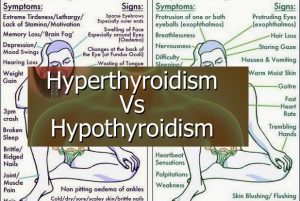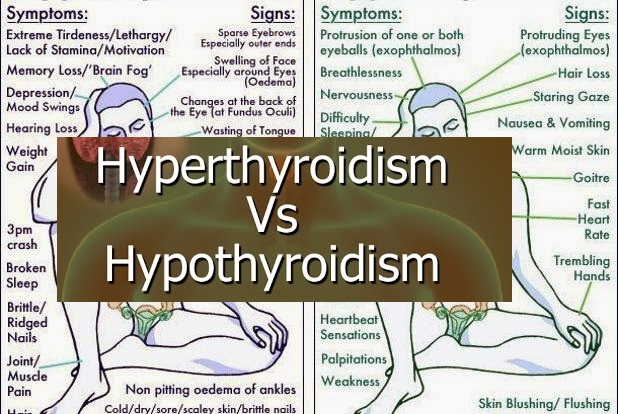Hyperthyroidism Vs Hypothyroidism
Hyperthyroidism vs. hypothyroidism – The thyroid, a butterfly-shaped gland located in the front and at the base of your neck. Acts as the control center for your body. The two conditions hypothyroidism and hyperthyroidism are different and act in distinctive terms. With their own causes and symptoms, let us know more in detail below about hyperthyroidism vs hypothyroidism.

So when something goes awry that leads to overactive thyroid or underactive thyroid. Your metabolism either rev up too high or slows way down, respectively. The effects of these two thyroids (hyperthyroidism and hypothyroidism) are different. And therefore have distinct symptoms. Here below is the difference between hyperthyroidism and hypothyroidism.
What is Hypothyroidism?
What is hypothyroidism? In short, your thyroid gland can’t make enough hormones to function well. The thyroid gland controls every aspect of your body’s metabolism. In hypothyroidism, the gland’s hormone production slows. This, in turn, slows your metabolism, which can lead to weight gain. Hypothyroidism is common and affects about 4.6 percent of the U.S. population.
According to the American Thyroid Association, there’s no cure for hypothyroidism. However, there are medications that can treat the disease. The goal of the medication is to improve your body’s thyroid function, restore hormone levels, and allow you to live a normal life.
Hashimoto’s thyroiditis condition is the most common cause of hypothyroidism. In this, your body attacks its own immune system. Over time, this attack causes the thyroid to stop producing hormones as it should which leads to hypothyroidism. Like many autoimmune diseases, Hashimoto’s thyroiditis occurs more frequently in women than men.
What is Hyperthyroidism?
As its name suggests, hyperthyroidism occurs when your body makes too much of the thyroid hormones, thyroxine (T4) and triiodothyronine (T3), and becomes overactive. You can experience a fast heartbeat, increased appetite, sensitivity to heat, anxiety, or sudden weight loss if you have hyperthyroidism.
Hyperthyroidism most commonly occurs in three ways :
- Thyroiditis, or an inflammation of the thyroid
- A thyroid nodule that produces too much T4 hormone
- An autoimmune condition is known n as Graves’ disease
- In hyperthyroidism, an irritation of your thyroid known as thyroiditis allows too much thyroid hormone to enter your blood. This can lead to pain and discomfort. Thyroiditis can also occur as a result of pregnancy. This is usually short-term.
The Differences Between Hypothyroidism and Hyperthyroidism
Hypothyroidism causes symptoms like slowed metabolism, tiredness, and weight gain. Having an underactive thyroid can decrease or slow down your bodily functions.
You may experience weight loss as opposed to weight gain. And you may feel anxious as opposed to depressed. Hypothyroidism leads to a decrease in hormones. Hyperthyroidism leads to an increase in hormone production.
What causes thyroid disease?
There are several different causes of thyroid disease. The following conditions cause hypothyroidism:
- Thyroiditis is an inflammation of the thyroid gland. This can lower the number of hormones produced.
- The hereditary painless disease of the immune system is Hashimoto’s thyroiditis.
The following conditions cause hyperthyroidism:
The disorder Thyroiditis, sometimes painful and in some cases it’s painless. It releases the hormones that were stored in the thyroid gland causing hyperthyroidism for a few weeks or months. In women after childbirth, the painless variety occurs most frequently
What are the symptoms of hypothyroidism and hyperthyroidism?
The following are symptoms for hypothyroidism:
- Fatigue
- Frequent, heavy menstrual periods
- Forgetfulness
- Weight gain
- Dry, coarse skin and hair
- Hoarse voice
- Intolerance to cold
The following are symptoms for hyperthyroidism:
- Irritability/nervousness
- Muscle weakness/tremors
- Infrequent, scant menstrual periods
- Weight loss
- Sleep disturbances
- Enlarged thyroid gland
- Vision problems or eye irritation
- Heat sensitivity
Conclusion
The aforementioned is the complete detail of hyperthyroidism vs hypothyroidism. Both disorders are distinctive and have their own effects on the body. Symptoms of both the disorders are different that helps to differentiate between the two. And the treatment of the disorders is according to the particular thyroid condition.



